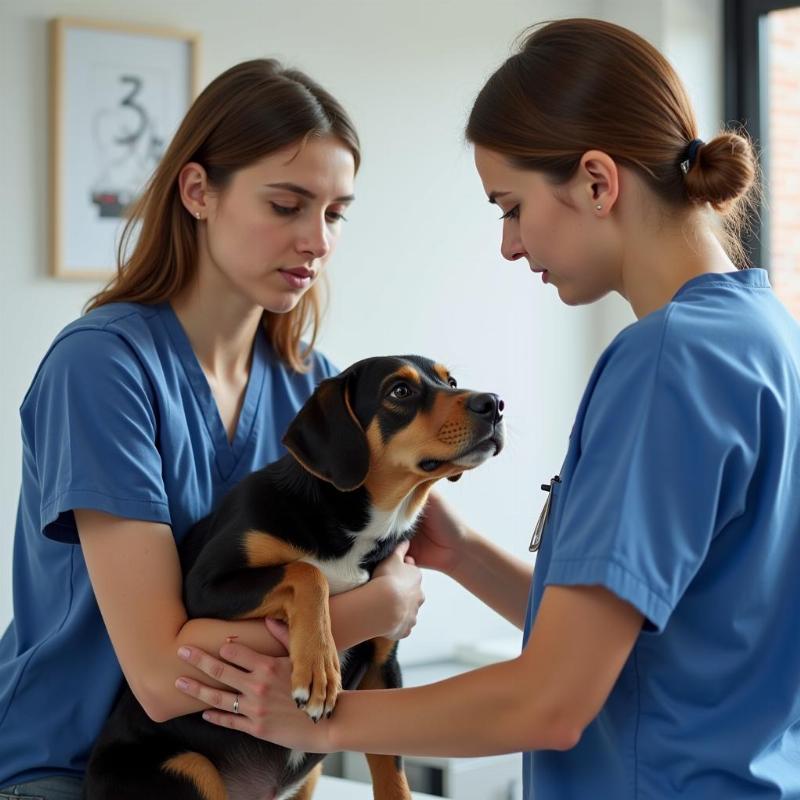If your dog just gobbled down a cockroach, you’re likely wondering if it’s cause for concern. While not a typical dog treat, the occasional cockroach ingestion usually isn’t a major health threat for most dogs in the US. However, there are a few potential issues to be aware of, including pesticide exposure, parasites, and bacterial infections. This article will dive into the details of what can happen if your dog eats a cockroach and what steps you should take.
Potential Risks of Cockroach Consumption in Dogs
Cockroaches are known to carry bacteria and parasites that can potentially cause illness in dogs. While a dog’s robust digestive system can often handle these uninvited guests, it’s not a risk-free scenario. Here’s a breakdown of the potential problems:
Pesticide Poisoning
One of the biggest risks associated with a dog eating a cockroach is secondary poisoning from insecticides. If you’ve used roach bait or sprays, your dog might ingest those chemicals along with the cockroach. This can be serious, even life-threatening. Symptoms of pesticide poisoning can vary depending on the type of chemical but may include vomiting, diarrhea, tremors, lethargy, or seizures.
Parasites
Cockroaches can carry parasites like roundworms, whipworms, and hookworms. These parasites can then be transmitted to your dog if they eat an infected cockroach. Regular deworming is important for preventing these parasites, especially if your dog has a habit of snacking on bugs.
Bacterial Infections
Cockroaches thrive in unsanitary environments, making them carriers of bacteria like salmonella and E. coli. While not all dogs will get sick from these bacteria, it’s a possibility. Symptoms of bacterial infection can include vomiting, diarrhea, fever, and lethargy.
What to Do If Your Dog Eats a Cockroach
If you witness your dog eating a cockroach, try to identify the type of cockroach, if possible. Larger cockroaches like American and Oriental cockroaches pose a greater risk of carrying parasites than smaller German cockroaches. Also, consider whether you’ve recently used any roach control products.
Observe Your Dog
Monitor your dog closely for any unusual signs, including:
- Vomiting
- Diarrhea
- Loss of appetite
- Lethargy
- Tremors or seizures
Contact Your Veterinarian
If your dog exhibits any of these symptoms, or if you suspect they’ve ingested a cockroach that’s been exposed to pesticides, contact your veterinarian immediately. They can advise you on the best course of action, which may include inducing vomiting or administering activated charcoal.
 Dog at the veterinarian
Dog at the veterinarian
Preventing Cockroach Consumption in Dogs
The best way to protect your dog from the potential dangers of eating cockroaches is to prevent access to them in the first place.
- Keep your home clean and free of food debris.
- Store food in sealed containers.
- Empty trash cans regularly.
- Use pet-safe roach control methods, if necessary.
- Consult with a pest control professional for effective and safe cockroach elimination strategies.
Expert Insight
Dr. Emily Carter, DVM, of Animal Care Clinic in Austin, Texas, advises, “While a single cockroach ingestion rarely causes serious problems in dogs, repeated exposure can increase the risk of parasitic and bacterial infections. Regular preventative veterinary care, including deworming, is crucial for maintaining your dog’s health.”
Conclusion
While not typically dangerous, cockroach consumption in dogs carries potential risks, especially concerning pesticide poisoning, parasites, and bacterial infections. By being vigilant about your dog’s environment and seeking prompt veterinary care if necessary, you can minimize these risks and keep your furry friend safe and healthy. Remember to always consult with your veterinarian for any health concerns regarding your pet.
FAQ
- Is it normal for dogs to eat cockroaches? While not ideal, dogs are naturally curious and might explore their environment by eating insects, including cockroaches.
- What should I do if my dog eats a cockroach that’s been poisoned? Contact your veterinarian or the ASPCA Animal Poison Control Center immediately.
- Can cockroaches kill my dog? While rare, severe pesticide poisoning from a contaminated cockroach or a serious bacterial/parasitic infection can be life-threatening.
- How can I prevent my dog from eating cockroaches? Maintain a clean home, store food properly, and use pet-safe pest control methods.
- Are there any home remedies for a dog that ate a cockroach? Do not attempt home remedies without consulting your veterinarian.
About Beautdogs.us
Beautdogs.us – your trusted source for comprehensive dog care information in the US. We offer expert guidance on various dog breeds, from common to rare, along with in-depth knowledge about health care, nutrition, and training. Our platform provides practical advice on responsible pet ownership, including legal matters and financial planning. We also review and recommend quality pet products, from food to grooming supplies. Whether you’re a new dog owner or a seasoned one, Beautdogs.us is your go-to destination for all things canine. When you need assistance, please contact Email: [email protected] for detailed and accurate answers.